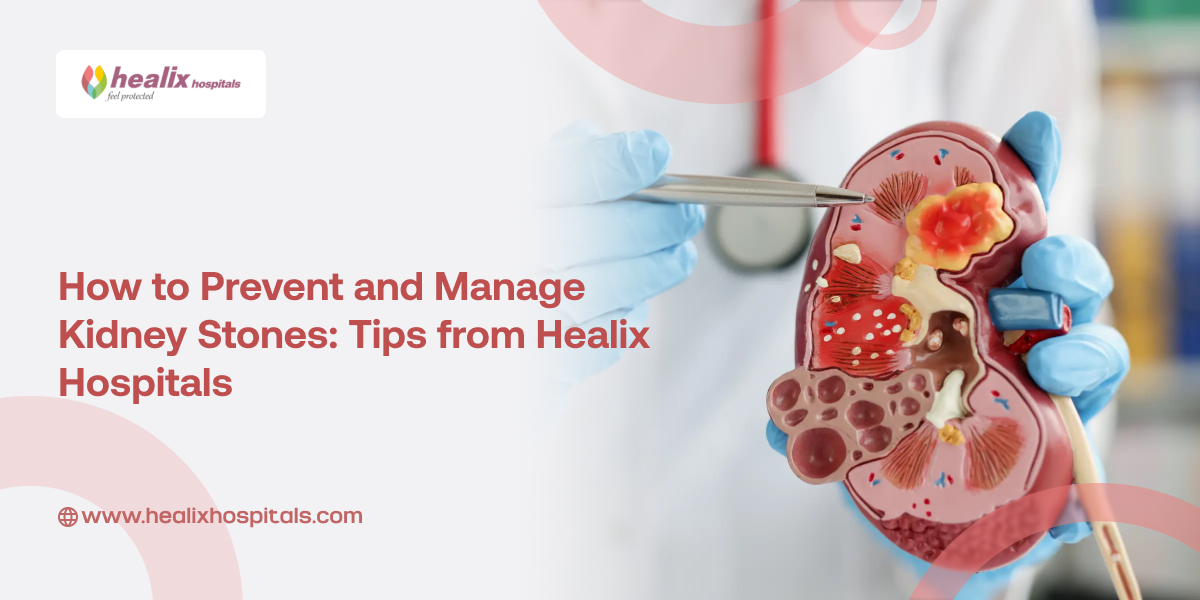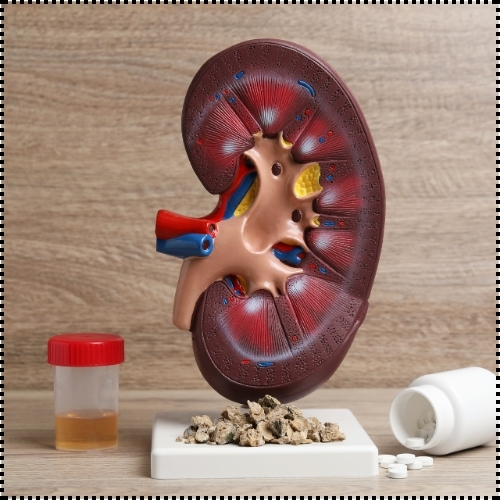

Kidney stones are a painful and common condition that affects millions of people worldwide. These hard mineral deposits can form in the kidneys and cause severe discomfort as they travel through the urinary tract. However, the good news is that there are several effective ways to prevent kidney stones and manage them if they do occur. In this comprehensive guide, we'll explore kidney stone prevention, managing kidney stones, and the best practices recommended by Healix Hospitals for maintaining optimal kidney health.
Understanding Kidney Stones: Causes and Symptoms
Before diving into how to prevent kidney stones, it’s important to understand what they are and how they form. Kidney stones are solid masses made up of tiny crystals that can form in the kidneys when there is a high concentration of certain substances in the urine. These substances, such as calcium, oxalate, and uric acid, can crystallize and stick together, forming stones.
Kidney stone symptoms can vary depending on the size and location of the stone. Common symptoms include:
- Severe pain in the side and back, below the ribs
- Pain that radiates to the lower abdomen and groin
- Painful urination
- Pink, red, or brown urine
- Nausea and vomiting
- Frequent urination
If you experience any of these symptoms, it’s crucial to seek medical attention immediately. At Healix Hospitals, our specialists are trained in kidney stone management and can provide the necessary care to alleviate your discomfort and treat the condition.

Best Practices for Kidney Health: Prevent Kidney Stones
Preventing kidney stones is possible by making some lifestyle changes and adopting healthy habits. Here are some of the best practices for kidney stone prevention:
- Stay Hydrated: One of the most effective ways to prevent kidney stones is by drinking plenty of water. Hydration and kidney stones are closely linked because adequate fluid intake helps dilute the substances in urine that can lead to stone formation. Aim to drink at least 8-10 glasses of water per day, and more if you live in a hot climate or exercise frequently.
- Adopt a Kidney-Friendly Diet: Dietary tips for kidney stones focus on reducing the intake of foods that contribute to stone formation. Limiting foods high in oxalates, such as spinach, nuts, and chocolate, can help. Additionally, reducing sodium intake and eating calcium-rich foods (not supplements) can also aid in kidney stone prevention.
- Manage Your Weight: Obesity is a risk factor for kidney stones, so maintaining a healthy weight through regular exercise and a balanced diet is crucial. Managing kidney stones involves not only addressing existing stones but also preventing future occurrences by staying within a healthy weight range.
- Limit Animal Protein: High-protein diets, especially those rich in animal proteins, can increase the risk of kidney stones. Foods like red meat, eggs, and seafood should be consumed in moderation as part of your strategy to prevent kidney stones.
- Monitor Your Calcium Intake: Contrary to popular belief, calcium is not your enemy when it comes to kidney stone prevention. In fact, dietary calcium can help bind oxalate in the intestines, preventing it from reaching the kidneys where stones can form. However, calcium supplements should be taken with caution and only under the guidance of a healthcare professional at Healix Hospitals.
How to Avoid Kidney Stones: Practical Tips
Understanding how to avoid kidney stones involves more than just making dietary changes. Here are some practical tips that can help:
- Limit Sugary Drinks and Alcohol: Beverages high in sugar, such as sodas and fruit juices, can increase the risk of kidney stones. Alcohol can also contribute to dehydration, making it harder to prevent kidney stones. Instead, opt for water, herbal teas, or other low-sugar beverages.
- Take Care with Supplements: Certain supplements, particularly those high in vitamin C or calcium, can increase the risk of stone formation. Always consult with a healthcare provider at Healix Hospitals before starting any new supplements as part of your kidney stone prevention plan.
- Stay Active: Regular physical activity can help you maintain a healthy weight, which is an essential aspect of kidney stone prevention. Exercise also promotes overall well-being, which can reduce the likelihood of developing kidney stones.
- Know Your Risk Factors: If you have a family history of kidney stones, you may be more prone to developing them. Understanding your risk factors and discussing them with a specialist at Healix Hospitals can lead to personalized strategies to prevent kidney stones.
- Regular Check-Ups: Routine medical check-ups are essential for monitoring your kidney health. At Healix Hospitals, our comprehensive kidney care services include screenings and assessments that can help detect issues early and implement effective kidney stone management strategies.

Managing Kidney Stones: What to Do if You Develop Them
Despite your best efforts to prevent kidney stones, it’s still possible to develop them. Managing kidney stones effectively involves a combination of medical treatment and lifestyle changes.
Kidney stone treatment options at Healix Hospitals include:
- Medication: Certain medications can help relax the muscles in the ureter, making it easier to pass a stone. Pain relief medications are also commonly prescribed to manage discomfort.
- Extracorporeal Shock Wave Lithotripsy (ESWL): This non-invasive procedure uses shock waves to break up kidney stones into smaller pieces that can be passed more easily.
- Ureteroscopy: In cases where the stone is too large to pass naturally, a ureteroscope can be used to remove or break up the stone.
- Surgery: For larger stones or those causing significant obstruction, surgical intervention may be necessary. Our team at Healix Hospitals is skilled in the latest surgical techniques for kidney stone management.
In addition to these treatments, managing kidney stones involves ongoing kidney stone prevention strategies to reduce the risk of recurrence. This includes following a kidney-friendly diet, staying hydrated, and regularly consulting with your healthcare provider at Healix Hospitals.

Dietary Tips for Kidney Stones: What to Eat and Avoid
Your diet plays a critical role in kidney stone prevention and management. Here are some dietary tips for kidney stones that can help:
- Increase Citrate Intake: Citrate is a compound that helps prevent the formation of kidney stones by binding with calcium in the urine. Foods high in citrate, such as lemons and oranges, can be beneficial.
- Reduce Oxalate-Rich Foods: As mentioned earlier, foods high in oxalates can contribute to stone formation. Limiting foods like beets, rhubarb, and sweet potatoes can aid in preventing kidney stones.
- Choose Plant-Based Proteins: Instead of relying heavily on animal proteins, incorporate more plant-based options like beans, lentils, and tofu into your diet. This switch can be a key part of your kidney stone management plan.
- Watch Your Salt Intake: High sodium levels can increase the amount of calcium in your urine, leading to kidney stones. Reducing salt in your diet is an effective way to prevent kidney stones.
- Eat Calcium-Rich Foods: While it may seem counterintuitive, eating foods high in calcium can actually help reduce the risk of kidney stones. Include dairy products, leafy greens, and fortified foods in your diet.
Conclusion: Taking Charge of Your Kidney Health
Kidney stones can be a painful and recurring issue, but with the right knowledge and proactive steps, you can significantly reduce your risk. Preventing kidney stones requires a commitment to a healthy lifestyle, including staying hydrated, following a balanced diet, and understanding your personal risk factors.
At Healix Hospitals, we are dedicated to providing top-tier kidney care and support for our patients. Our team of specialists is here to guide you through every step of kidney stone prevention and management, offering personalized treatment plans tailored to your needs.
By following these best practices for kidney health, you can take control of your well-being and minimize the likelihood of developing kidney stones. Remember, prevention is always better than cure, and with the expert care at Healix Hospitals, you can maintain a healthy and stone-free life.
Also Read: Understanding Urology: What Every Patient Should Know – Healix Hospitals